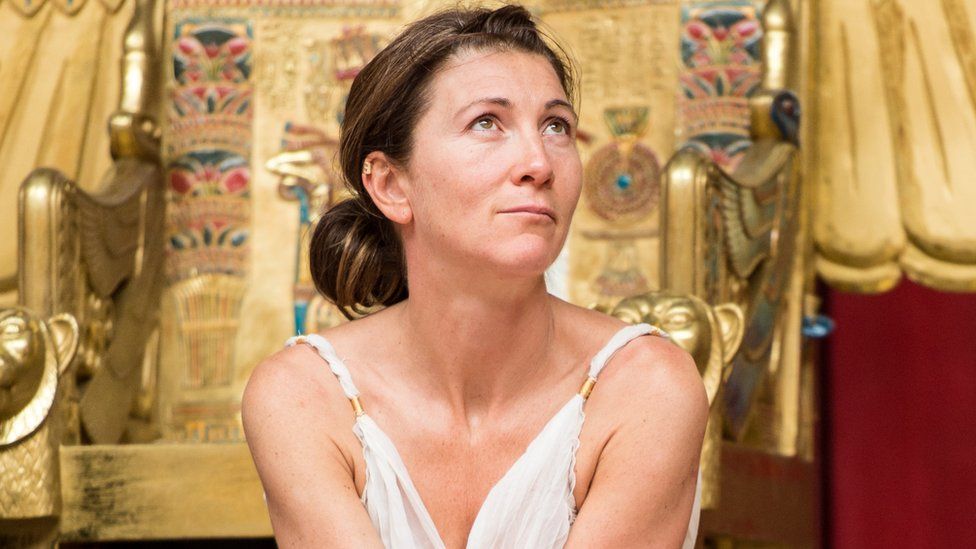What can you learn from Shakespeare’s heroines?
- Published

Kim Kardashian West might be today's leading lady, but teenage girls could learn a lot more from Shakespeare's heroines, a head teacher has claimed.
Jane Lunnon, head of Wimbledon High School, says Shakespeare's Cleopatra, Beatrice, Rosalind and Viola are far better role models.
So what did William Shakespeare's heroines know that might help teenagers today?
The heroines on Mrs Lunnon's list have one thing in common.
They were all underestimated, says Erica Whyman, deputy artistic director of the Royal Shakespeare Company (RSC).
"What ties together all of these characters is that they are treated as though they don't have the political or intellectual firepower that they have," she says.
Whyman says Shakespeare was very perceptive about society's expectations of women, and he liked to overturn them.
Cleopatra: 'Never weak'
Pointing out parallels with Kardashian West, Mrs Lunnon picked Cleopatra as a role model who "shows that you can be both flawed and brilliant".
The beautiful and seductive Cleopatra, Queen of Egypt, ultimately kills herself for love. She was a skilled manipulator of her own image - she used clothes and spectacle to dramatise her power.
Cleopatra is the "most extreme" heroine on Mrs Lunnon's list, says Ms Whyman.
As a leader she is not only powerful and financially independent but she inspires loyalty from her female companies.
Dr Farah Karim-Cooper, Head of Higher Education & Research at Globe Education, says Cleopatra "also demonstrated that she is able to speak as eloquently, intelligently and on equal par with some of the greatest male figures in history: Julius Caesar, Marc Antony and Octavius Caesar".
She may have played love games with disastrous consequences, says Karim-Cooper, but "she was never weak or subservient".
Ms Whyman says it's important that she is flawed. "She shows us that strength and determination can take you to extreme places - where you learn about yourself and where you can persuade others that the radical is possible.
"We need people who protest."
Beatrice: 'Breaks all the rules'
Beatrice is the "perfect role model" for young girls, according to Dr Karim-Cooper.
Strong and witty, Beatrice rails against the unequal status of women with her high-spirited intellect in Much Ado About Nothing. She's also fiercely loyal to her female cousin Hero, showing that female fellowship is important.
Ms Whyman says Shakespeare paints her as a woman who is expected to be one thing, polite and charming, when actually she is rude and hilarious.
"She breaks all the rules and we love her for it.
"I see this every day in young women: they don't think they are allowed to ask for what they really want. But Beatrice tells the truth about what she wants, and it's thrilling."
Dr Karim-Cooper says Beatrice has the attitude that suggests if she never marries, she'll be perfectly all right.
"Her aim in life is not to marry, but when she does it is out of love and mutuality," she says.
Rosalind: 'All about me'
One of Shakespeare's most famously strong and vocal women, the exiled Rosalind in As You Like It goes into disguise as a shepherd.
"Rosalind is one of my favourites," says Ms Whyman. Rosalind delivers the epilogue in the play, which is usually a man's job - and she knows it.
"But she just styles it out.
"She gets to the end of the play and she just says to the audience, 'Why wouldn't it be about me? The whole play is about me.'"
In today's world, with Prime Minister Theresa May and German Chancellor Angela Merkel "still answering for the fact that they are a woman in the public eye", Rosalind is a great role model, says Whyman.
Dr Karim-Cooper says Rosalind also uses her voice to teach a man how to speak the words of love without putting her on a pedestal.
"Rosalind wisely shows that love is something that can't be prettified with poetry...
"She shows how love is the great leveller between men and women, and that it is not something that should be used to wield power".
Viola: 'So bold'
The resourceful Viola in Twelfth Night survives a shipwreck, so she is first and foremost a survivor.
She goes on to disguise herself as a young man to find work, and charms a young woman, Olivia, with her frank wit and honesty, but even in disguise she demonstrates the capacity for female fellowship, says Dr Karim-Cooper.
It is in disguise that Viola makes an unexpected discovery about relationships, Ms Whyman says.
"She discovers the power of putting one identity down and trying another one," she says, adding that being a man "liberates her".
"She is so bold... but that's still not the way we teach young women and girls to enter into relationships - we still say that the man should be romantic, organise dates, propose marriage," Whyman says.
For Karim-Cooper, Viola brings a peace and an intellectual companionship that demonstrates how Shakespeare values mutual dependence in relationships between men and women.
Titania: 'Brilliant leader'
As director of the RSC's most recent production of A Midsummer Night's Dream, Ms Whyman says she has spent most of the last two years thinking about Titania, Queen of the Fairies.
Though Titania is not on Mrs Lunnon's original list, she and Cleopatra provide older role models for young women.
"The women who girls might become," says Whyman.
The audience meets Titania in the middle of a fierce row with her husband, the King, which causes disruption to the human world and its seasons.
Shakespeare wrote the play a year or so after serious flooding hit England, and in this play his characters speak "very specifically" about climate change.
Titania interrupts the row to tell the King their debate is nonsense, and that it's not about them, it's about others whom they have a responsibility, as "parents", to look after.
"She's a brilliant leader and we don't expect that of her," Whyman says.
- Published5 October 2016